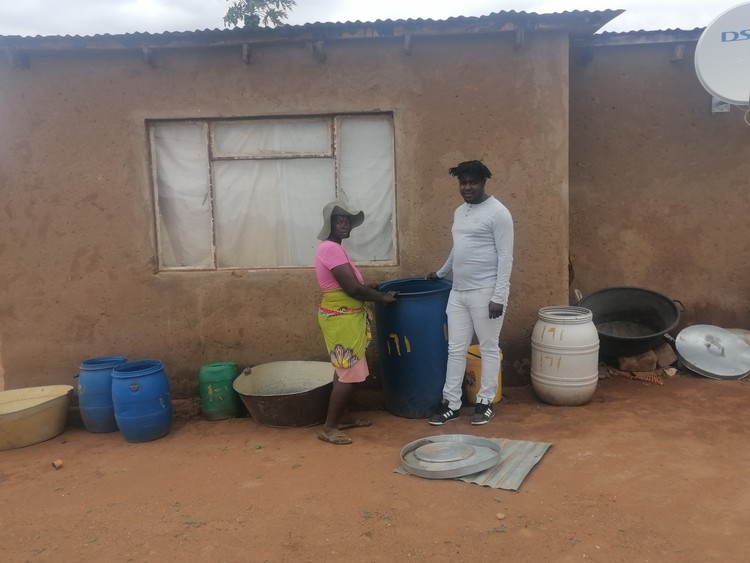
14 November 2023
Daphney Tshifaro and Xivuriso Ngomani at Tshifaro’s homestead in Makhasa village in the Malamulele region, Limpopo. Many villagers have to use drums and buckets to try collect rainwater, as there is no municipal water supply. Photos: Bernard Chiguvare
Villagers in the Malamulele region in Limpopo say they have been without consistent running water for nearly 20 years.
Malamulele, about 20 kilometres from Thohoyandou, is home to thousands of residents in nearly 99 rural villages. Earlier this month we visited the villages of Makhasa and Greenfarm where residents had placed containers under the eaves of their roofs to catch water, as it was anticipated it would rain later that day.
Makhasa, Greenfarm and other neighbouring villages are among the affected areas in Limpopo which were identified in a recent South African Human Rights Commission (SAHRC) report on lack of access to water in various districts in the Limpopo Province. About a third of the population in Limpopo has no access to municipal water despite 90% of the dams in the province being full, the report found.
According to the report, the Vhembe District Municipality (VDM) – which is the authority in Malamulele — had 14 water trucks to deliver water to affected villages. But most residents say this does not happen frequently, resulting in them going days without having access to clean water.
Resident Daphney Tshifaro from Makhasa village said people have to walk about a kilometre with their containers to buy water from households with boreholes, or they pray for rain so they can fill their plastic drums.
“I am unemployed and rely on social grants. I have to harvest the water on rainy days or I have to buy it every day which can get very expensive for me. A 25-litre drum costs R5 to refill and per day I use approximately eight to nine drums,” said the mother of five children.
Their water woes continue, despite Vhembe District Municipality having installed taps 15 years ago and drilled a communal borehole in 2022. This borehole was expected to supply water to the village’s 400 households.
Community leader Xivuriso Ngomani told GroundUp the municipality’s borehole has never been operational. “They always promise to complete the job so that residents get water. We were happy when VDM drilled a borehole but it has been a year, and the borehole is not yet working. We are not sure why it is not working,” said Ngomani.
Ngomani said Makhasa residents have approached the municipality several times over their water challenges, but nothing has changed. “The whole water infrastructure is broken. That water came from a small dam and VDM has failed to maintain the infrastructure,” said Ngomani.
Greenfarm village has about 2,000 households and two communal boreholes which were drilled in 2020. However, residents say these boreholes also do not function. “The municipality drilled the boreholes and abandoned them. The VDM keeps promising to complete the project,” said Simon Sithole, a community activist.
Simon Sithole, a community activist at Greenfarm village, says the municipality drilled the two communal boreholes last year but they are not operational.
Sithole said the two boreholes were also never fenced off. “VDM is failing us. We cannot do much without consistent water supply,” said Sithole.
Last month, the Human Rights Commission released its report following “a concerning number of complaints” it had received from Limpopo communities struggling to access water.
The commission held an inquiry into access to water and the efficacy of water services authorities in Limpopo in October 2021. The SAHRC only released its report on 16 October 2023 in Polokwane.
The damning report found that about 1.4-million people in Limpopo had no piped water. Many of those in rural areas had to collect their drinking and cooking water from rivers and streams. Seven of the ten municipalities in the province do not comply with the provisions of the Water Services Act.
The municipalities were given three months to present a detailed plan, including timeframes, on how they will provide water to every resident within their jurisdiction.
Asked about the inactive boreholes in Makhasa, Greenfarm, Vhembe District Municipality (VDM) spokesperson Matodzi Ralushai told GroundUp the municipality is waiting for Eskom to procure material needed to bring the pumps online.
Ralushai said the municipality delivers water through tankers but due to the limited number of water trucks, the municipality is unable to meet the water demand in all affected villages.
According to the SAHRC report, the VDM has many projects that have not been completed, leading to Musina, Malamulele, Makhado and many other areas having inconsistent water supply. This, it states, also violates the Water Service Act and the constitutional right to have access to sufficient water.